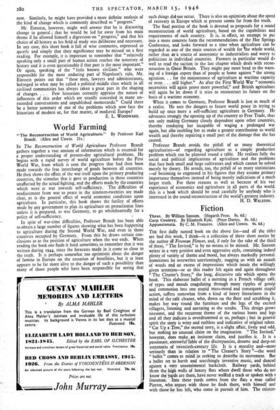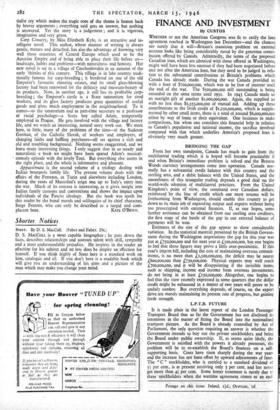Fiction
THE first dully named book on the above list—and all the titles are bad this week, I think—is a collection of three short stories by the author Of Fireman Flower, and, if only for the sake of the third of these, " The Invited," is by no means to be missed. Mr. Sansom writes in a very positive and even aggressive style, containing indeed plenty of variety of theme and mood, but always markedly personal. Sometimes he overwrites unrelentingly, nagging us with an assault of words and an excess of impressions which insult the willingly given attention—or so this reader felt again and again throughout " The Cleaner's Story," the long, discursive tale which opens the book. This elaborate ballet of a morning in a French village café, of types and moods coagulating through many ripples of gossip and commotion into one stupid mass-mood and consequent stupid action, suffers somewhat from a kind of heavy literariness in the mind of the café cleaner, who, down on the floor and scrubbing it, makes her way round the furniture and the legs of the excited villagers, listening and narrating as she scrubs. This design grows tiresome, and the recurrent theme of the various boots and legs and all they indicate is overdrummed at us, perhaps ; but in general spirit the story is witty and ruthless and indicative of original talent. " Cat Up a Tree," the second story, is a slight affair, lively and odd, but making no unusual claim on the imagination. " The Invited," however, does make an insistent claim, and justifies it. It is a passionate, sorrowful fable of the discrepancies, dreams and deep-set rottenness of twentieth-century life. It is a morality and—.more seriously than in relation to "The Cleaner's Story "—the word " ballet " comes to mind in seeking to describe its movement. But a ballet set to harsh and searchingly inventive music, and danced against a very unsentimental backcloth. Railway yards, behind them the high walls of luxury flats where dwell those who do not know the yards are there, have never walked a track or spoken with a linesman. Into these yards comes from the flats a man called Pierrot, who .argues with those he finds there, with himself and with those he has left, who come in pursuit of him. The existen- tialist cry which makes the tragic core of the theme is beaten back by braver arguments • everything said gets an answer, but nothing is answered. Yet the story is a judgement ; and it is vigorous, -imaginative and very grave.
Carp Country, by Miss Elizabeth Kyle, is an attractive and in- telligent novel. This author, whose manner of writing is always gentle, mature and detached, has also the advantage of knowing very well those countries of Central Europe which used to be the Austrian Empire and of being able to place their life before us- landstape, habits and problems—with naturalness and honesty. Her new novel is set in a village of Czechoslovakia in an autumn of the early 'thirties of this century. This village is in lake country tradi- tionally famous for carp-breeding ; it bordered on one of the old Emperor's favourite shooting estates, and its small glass-blowing factory had been renowned for the delicacy and museum-beauty of its products. Now, in another age, it still has its profitable carp- breeding ; the Emperor's castle is a State sanatorium for tired workers, and its glass factory produces great quantities of useful goods and gives much employment in the neighbourhood. To it comes—to the sanatorium and as part-time secretary to a professor of racial psychology—a Scots boy called Adam, temporarily employed in Prague. He gets involved with the village and factory life, and we watch an interesting, natural story work out. We meet here, in little, many of the problems of the time—of the Sudeten German, of the Catholic Slovak, of workers ' and employers, of changing faiths and baffling psychoses—all set against a rich and old and troubling background. Nothing seems exaggerated, and we learn many interesting things. I only suggest that in so steady and naturalistic -a book we might have been spared Adam's musical- comedy episode with the lovely Toni. But everything else seems in the right place, and the whole is informative and pleasant.
Appassionata is the second volume of a triology dealing with Italian bourgeois family life. The present volume deals with the affairs of the Ferreros, in Turin and elsewhere including London, during the years of Mussolini's reign ann up to Italy's entry into the war. Much of its content is interesting, as it gives insight into Italian family customs and conventions and shows the impact upon individuals of the Fascist ideology. But the book was spoilt for this reader by the banal moods and soliloquies of its chief character, Serge Ferrero, who can only. be described as a turgid and com-



























 Previous page
Previous page